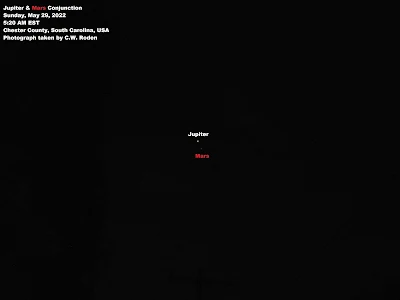Good morning everyone!
In the early morning hours of Monday, May 29th I was able to capture a good pair of close-up shots of the planets Mars and Jupiter in close conjunction where they appear separated by about the width of a full moon, or about 0.5 degrees apart in the night sky.
In the second shot, a close-up of the conjunction, I captured Mars and Jupiter along with at least three of the planets four largest moons which appear as little white dots.
Jupiter, the 5th planet from the Sun, is the largest gas giant planet in our Solar System at about 43,441 miles across and the third brightest natural object in the Earth's night sky after the Moon and the planet Venus. Mars, the 4th planet from the Sun and our Earth's nearest planetary neighbor, is about 2,106 miles across.
These two planets are neighboring worlds and although they appear to be close to each other as seen here from Earth, the two planets are in fact currently separated by about 350 million miles and the asteroid belt that we cannot see with the naked eye.
These two planets are neighboring worlds and although they appear to be close to each other as seen here from Earth, the two planets are in fact currently separated by about 350 million miles and the asteroid belt that we cannot see with the naked eye.
As this month comes to a close over the next few days, Mars will seem to be moving higher up in the sky away from Jupiter in the eastern sky. About the middle of June 2022, the smallest and nearest planet to the Sun, Mercury, will appear above the horizon ahead of the sunrise and there will be an opportunity to see all five of the "Wandering Stars" (the planets of the Solar System visible to the naked eye: Mercury, Venus, Mars, Jupiter, and Saturn) in the early morning hours in a line across the sky.


No comments:
Post a Comment